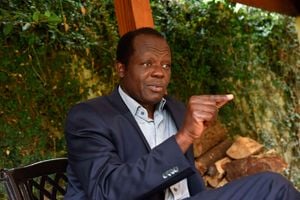Relief for bisexual Kenyan facing deportation from Canada

The LGBTQ flag.
A Kenyan man who identifies as bisexual has been granted a one-year temporary stay in Canada, just a day before he was due to be deported to Kenya.
Charles Mwangi, 48, was due to board a plane on Sunday morning with a one-way ticket back to Kenya, a country he says he fled in 2019 fearing persecution for being LGBTQ+.
Migrant Workers Alliance for Change, an organisation supporting him, said in a press release on Saturday that Mr Mwangi, who lives in Toronto, Canada, had been granted temporary residency after a wave of petitions, protests and an urgent application to the United Nations Human Rights Committee.
“I’m so happy today, we have won,” he said in the press release, adding that the journey of undocumented people is “not a joke, it’s a nightmare.”
Mr Mwangi said he fled Kenya after receiving death threats and abuse because of his sexuality before arriving in Canada. He feared being forcibly returned, particularly as his activism and the notoriety of his case put him at even greater risk of persecution in Kenya.
The man and his supporters protested his deportation order last week outside the office of his local MP, Judy Sgro, to fight for his right to stay.
Mr Mwangi eventually pleaded his case inside the MP's office and delivered a petition signed by more than 4,600 people calling on the federal government to intervene and stop the deportation order.
“Thank you to everyone who supported me and took action,” he said after learning that he would not be deported.
“We all believe Canada is a safe haven for LGBTQ+ (Lesbian, Gay, Bisexual, Transgender, Queer or Questioning) people, but when you come here, things can be opposite because I don't know how I can explain my sexuality to anybody.”
In the release, the Migrant Workers Alliance said that Mr Mwangi has been an active community member, working on the front lines as a personal support worker during the Covid-19 pandemic. He currently works in two shelters in Toronto, supporting both youth and adults.
According to a copy of the UN application, his refugee claim was denied because the adjudicator did not find Mr Mwangi, who is married with two children, to be a credible bisexual man, despite his sworn testimony, the testimony of a man he reportedly dated in Toronto, and his activism with local LGBTQ+ organisations.
In 2019, the High Court in Kenya declined to strike down colonial-era laws criminalising gay sex. It upheld the criminalisation of gay relationships on the grounds that Kenya's 2010 constitution, which defines marriage as between people of the opposite sex, would be undermined if gay people were allowed to live together.
According to Human Rights Watch (HRW), more than half the countries in sub-Saharan Africa have anti-homosexuality laws, although others have moved towards legal tolerance.
Last year, the Supreme Court upheld the right of the National Gay and Lesbian Human Rights Commission (NGLHRC) to register.
Ten years ago, Kenya's NGO Coordination Board refused to register the NGLHRC on the grounds that it 'promotes same-sex behaviour'.
But in February last year, the Supreme Court said the Board was wrong to stop the NGLHRC from registering, allowing it to be formally recognised as an organisation.
By a majority of three judges to two, the court ruled that the board's refusal to register a non-governmental organisation (NGO) that seeks to promote the rights of LBGTQ+ people in Kenya was discriminatory in light of the provisions of Section 27(4) of the Constitution. The court also described the refusal as "unreasonable and unjustified".
The provisions say that the “State shall not discriminate directly or indirectly against any person on any ground, including race, sex, pregnancy, marital status, health status, ethnic or social origin, colour, age, disability, religion, conscience, belief, culture, dress, language or birth".
The Supreme Court said that by refusing to register the NGO, it was condemning people before they had broken the law.
Under the Penal Code, same-sex sexual activity is a crime punishable by imprisonment.
Sections 162 and 165 of the Penal Code criminalise male homosexual relations, while section 163 carries a seven-year prison sentence.
“As long as Sections 162, 163 and 165 of the Penal Code remain valid laws, then the actions of the board, in refusing to allow the reservations of names which include the terms “gays” and “lesbians”, cannot be considered unreasonable, irrational or illegitimate,” they said.
Sections 162 and 165 criminalise male homosexual relations, while section 163 carries a seven-year jail term.





